Analyzing Nestle's Business Environment, Stakeholders, and Ethics
VerifiedAdded on 2020/01/28
|21
|6102
|382
Report
AI Summary
This report provides a comprehensive analysis of Nestle's business environment, examining its organizational structure, stakeholder relationships, and corporate social responsibilities. It identifies Nestle as a public-sector organization and explores its collaborations with private and voluntary sector entities like Tesco, First Milk, and PhunkyFoods. The report delves into Nestle's objectives, highlighting its focus on providing quality goods and services while addressing the needs of various stakeholders, including customers, suppliers, and employees. It further explores Nestle's environmental and ethical responsibilities, including its efforts to reduce carbon emissions, promote sustainable practices, and adhere to ethical business standards, such as the Equal Pay Act. The analysis covers Nestle's partnerships with organizations like the World Bank and FLA, showcasing its commitment to sustainable water management and addressing child labor issues. Overall, the report offers a detailed overview of Nestle's business operations and its engagement with the broader business environment, emphasizing the company's commitment to ethical and sustainable practices.

Table of Contents
1
1
Paraphrase This Document
Need a fresh take? Get an instant paraphrase of this document with our AI Paraphraser
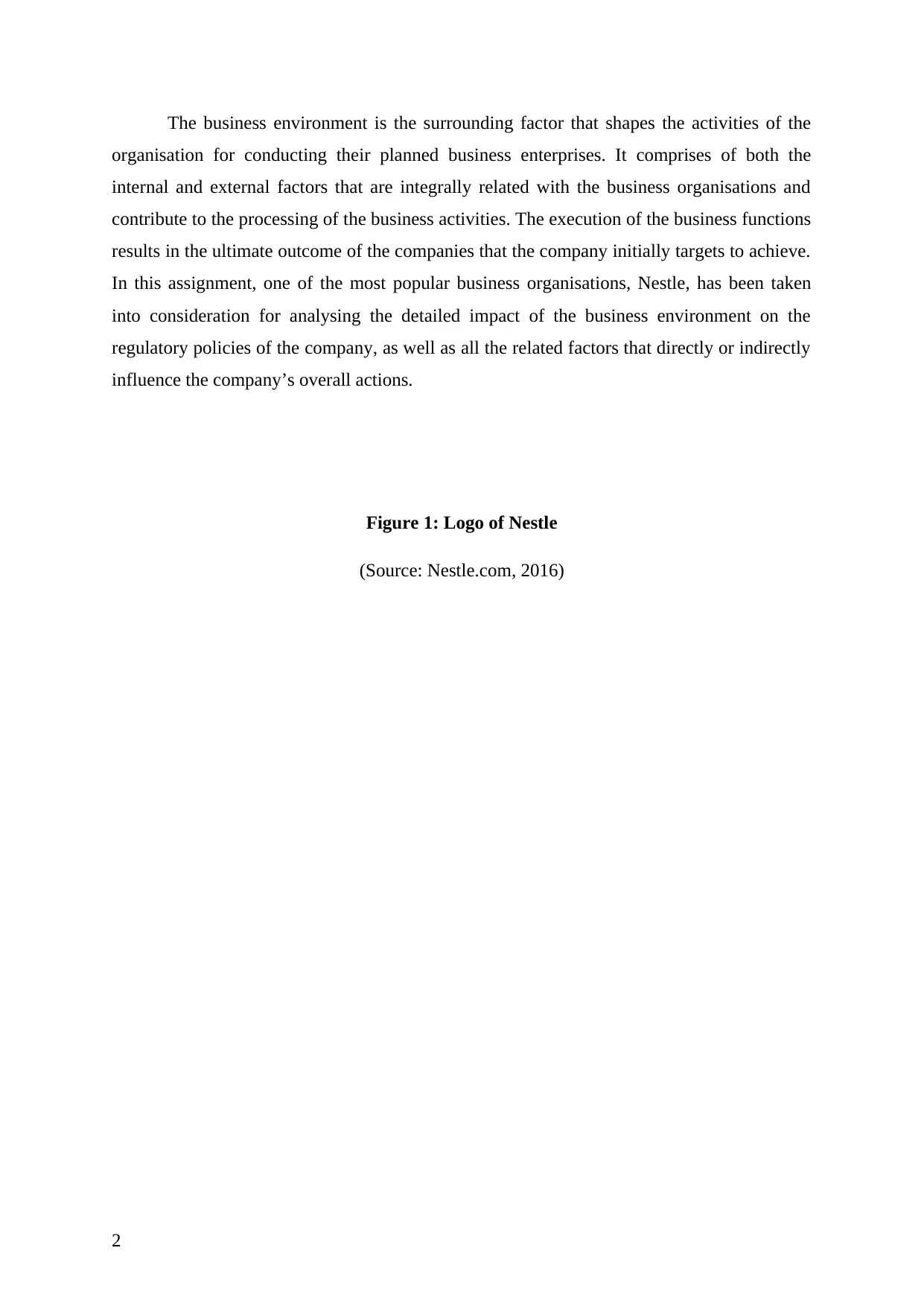
The business environment is the surrounding factor that shapes the activities of the
organisation for conducting their planned business enterprises. It comprises of both the
internal and external factors that are integrally related with the business organisations and
contribute to the processing of the business activities. The execution of the business functions
results in the ultimate outcome of the companies that the company initially targets to achieve.
In this assignment, one of the most popular business organisations, Nestle, has been taken
into consideration for analysing the detailed impact of the business environment on the
regulatory policies of the company, as well as all the related factors that directly or indirectly
influence the company’s overall actions.
Figure 1: Logo of Nestle
(Source: Nestle.com, 2016)
2
organisation for conducting their planned business enterprises. It comprises of both the
internal and external factors that are integrally related with the business organisations and
contribute to the processing of the business activities. The execution of the business functions
results in the ultimate outcome of the companies that the company initially targets to achieve.
In this assignment, one of the most popular business organisations, Nestle, has been taken
into consideration for analysing the detailed impact of the business environment on the
regulatory policies of the company, as well as all the related factors that directly or indirectly
influence the company’s overall actions.
Figure 1: Logo of Nestle
(Source: Nestle.com, 2016)
2
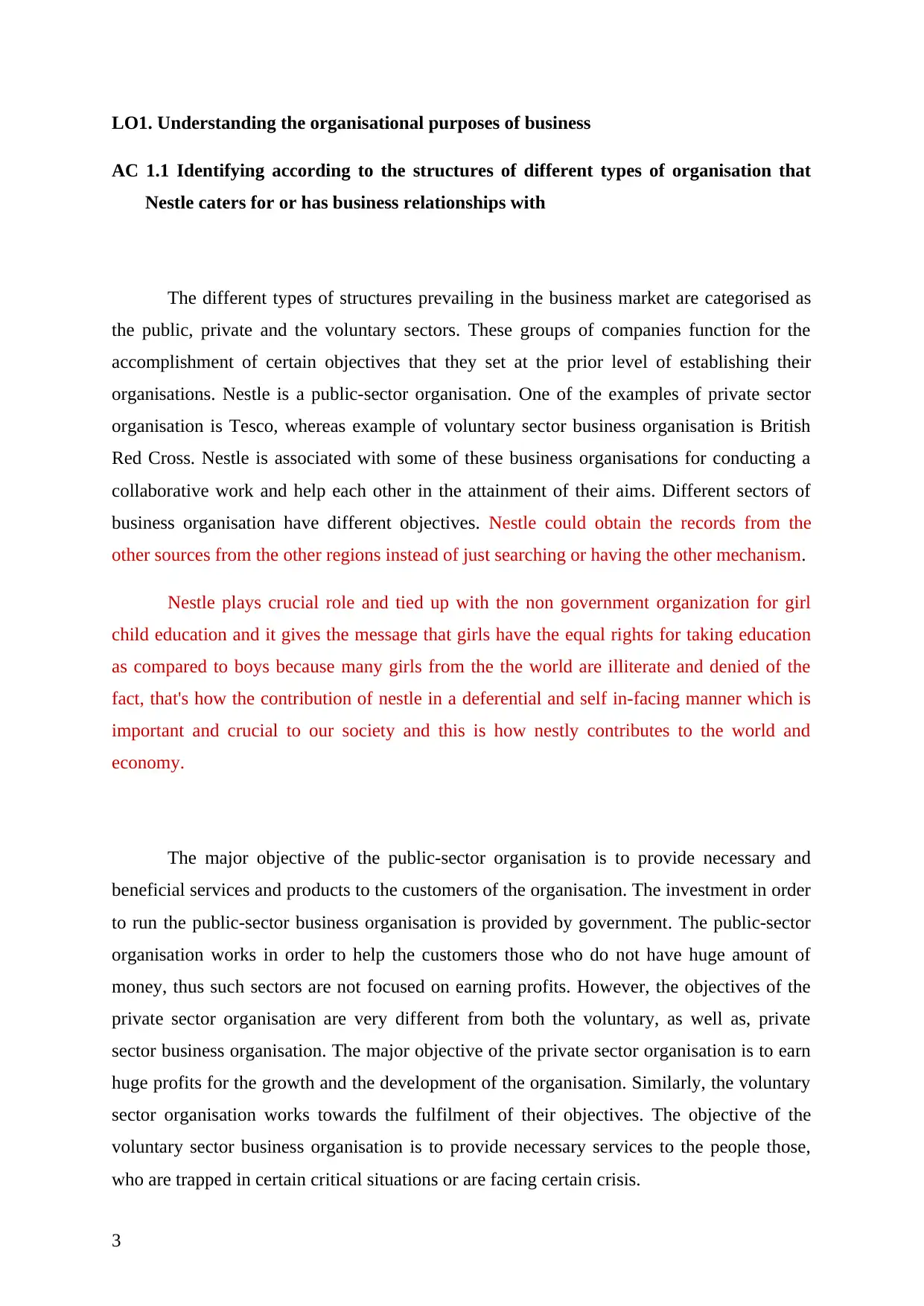
LO1. Understanding the organisational purposes of business
AC 1.1 Identifying according to the structures of different types of organisation that
Nestle caters for or has business relationships with
The different types of structures prevailing in the business market are categorised as
the public, private and the voluntary sectors. These groups of companies function for the
accomplishment of certain objectives that they set at the prior level of establishing their
organisations. Nestle is a public-sector organisation. One of the examples of private sector
organisation is Tesco, whereas example of voluntary sector business organisation is British
Red Cross. Nestle is associated with some of these business organisations for conducting a
collaborative work and help each other in the attainment of their aims. Different sectors of
business organisation have different objectives. Nestle could obtain the records from the
other sources from the other regions instead of just searching or having the other mechanism.
Nestle plays crucial role and tied up with the non government organization for girl
child education and it gives the message that girls have the equal rights for taking education
as compared to boys because many girls from the the world are illiterate and denied of the
fact, that's how the contribution of nestle in a deferential and self in-facing manner which is
important and crucial to our society and this is how nestly contributes to the world and
economy.
The major objective of the public-sector organisation is to provide necessary and
beneficial services and products to the customers of the organisation. The investment in order
to run the public-sector business organisation is provided by government. The public-sector
organisation works in order to help the customers those who do not have huge amount of
money, thus such sectors are not focused on earning profits. However, the objectives of the
private sector organisation are very different from both the voluntary, as well as, private
sector business organisation. The major objective of the private sector organisation is to earn
huge profits for the growth and the development of the organisation. Similarly, the voluntary
sector organisation works towards the fulfilment of their objectives. The objective of the
voluntary sector business organisation is to provide necessary services to the people those,
who are trapped in certain critical situations or are facing certain crisis.
3
AC 1.1 Identifying according to the structures of different types of organisation that
Nestle caters for or has business relationships with
The different types of structures prevailing in the business market are categorised as
the public, private and the voluntary sectors. These groups of companies function for the
accomplishment of certain objectives that they set at the prior level of establishing their
organisations. Nestle is a public-sector organisation. One of the examples of private sector
organisation is Tesco, whereas example of voluntary sector business organisation is British
Red Cross. Nestle is associated with some of these business organisations for conducting a
collaborative work and help each other in the attainment of their aims. Different sectors of
business organisation have different objectives. Nestle could obtain the records from the
other sources from the other regions instead of just searching or having the other mechanism.
Nestle plays crucial role and tied up with the non government organization for girl
child education and it gives the message that girls have the equal rights for taking education
as compared to boys because many girls from the the world are illiterate and denied of the
fact, that's how the contribution of nestle in a deferential and self in-facing manner which is
important and crucial to our society and this is how nestly contributes to the world and
economy.
The major objective of the public-sector organisation is to provide necessary and
beneficial services and products to the customers of the organisation. The investment in order
to run the public-sector business organisation is provided by government. The public-sector
organisation works in order to help the customers those who do not have huge amount of
money, thus such sectors are not focused on earning profits. However, the objectives of the
private sector organisation are very different from both the voluntary, as well as, private
sector business organisation. The major objective of the private sector organisation is to earn
huge profits for the growth and the development of the organisation. Similarly, the voluntary
sector organisation works towards the fulfilment of their objectives. The objective of the
voluntary sector business organisation is to provide necessary services to the people those,
who are trapped in certain critical situations or are facing certain crisis.
3
⊘ This is a preview!⊘
Do you want full access?
Subscribe today to unlock all pages.

Trusted by 1+ million students worldwide
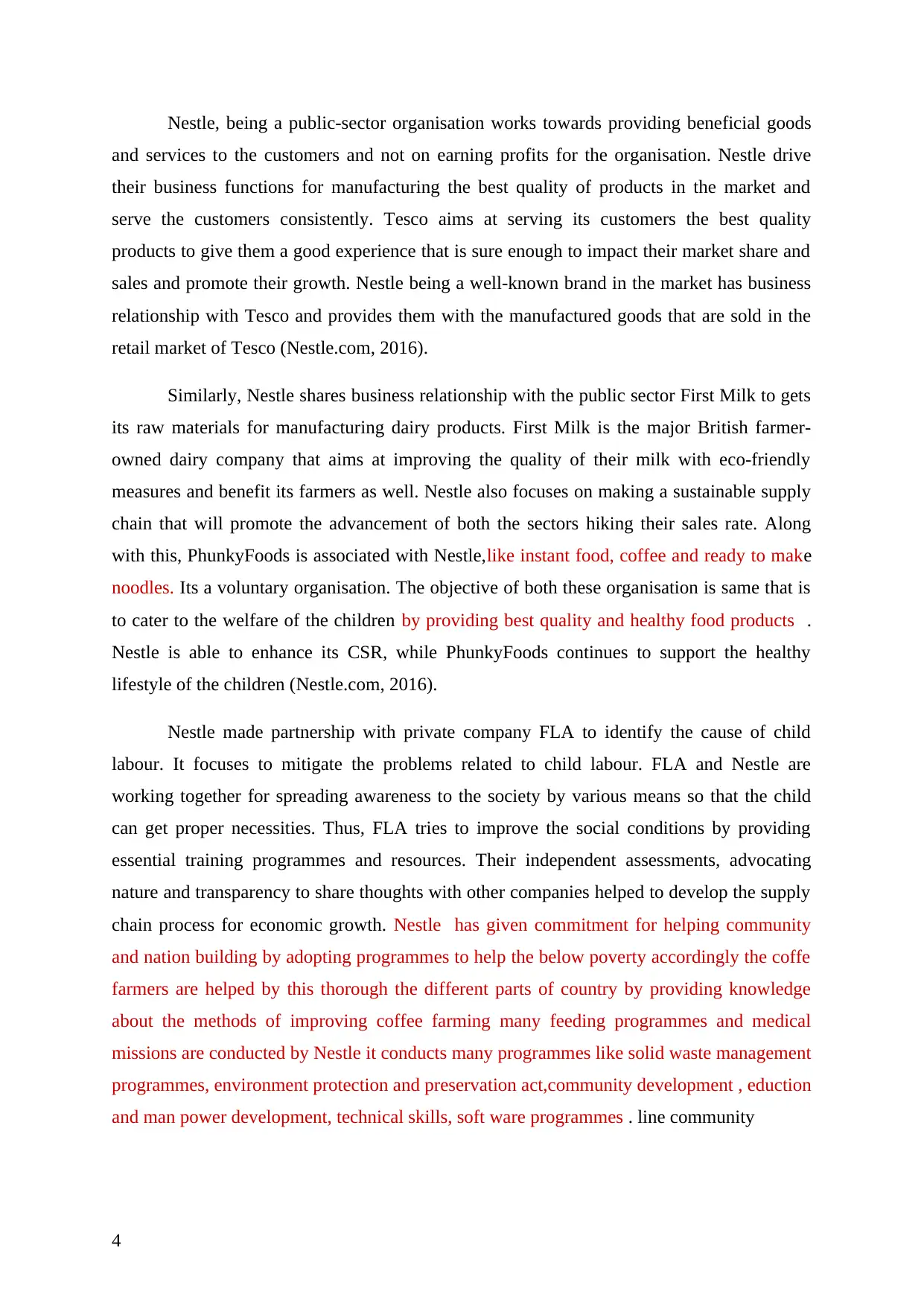
Nestle, being a public-sector organisation works towards providing beneficial goods
and services to the customers and not on earning profits for the organisation. Nestle drive
their business functions for manufacturing the best quality of products in the market and
serve the customers consistently. Tesco aims at serving its customers the best quality
products to give them a good experience that is sure enough to impact their market share and
sales and promote their growth. Nestle being a well-known brand in the market has business
relationship with Tesco and provides them with the manufactured goods that are sold in the
retail market of Tesco (Nestle.com, 2016).
Similarly, Nestle shares business relationship with the public sector First Milk to gets
its raw materials for manufacturing dairy products. First Milk is the major British farmer-
owned dairy company that aims at improving the quality of their milk with eco-friendly
measures and benefit its farmers as well. Nestle also focuses on making a sustainable supply
chain that will promote the advancement of both the sectors hiking their sales rate. Along
with this, PhunkyFoods is associated with Nestle,like instant food, coffee and ready to make
noodles. Its a voluntary organisation. The objective of both these organisation is same that is
to cater to the welfare of the children by providing best quality and healthy food products .
Nestle is able to enhance its CSR, while PhunkyFoods continues to support the healthy
lifestyle of the children (Nestle.com, 2016).
Nestle made partnership with private company FLA to identify the cause of child
labour. It focuses to mitigate the problems related to child labour. FLA and Nestle are
working together for spreading awareness to the society by various means so that the child
can get proper necessities. Thus, FLA tries to improve the social conditions by providing
essential training programmes and resources. Their independent assessments, advocating
nature and transparency to share thoughts with other companies helped to develop the supply
chain process for economic growth. Nestle has given commitment for helping community
and nation building by adopting programmes to help the below poverty accordingly the coffe
farmers are helped by this thorough the different parts of country by providing knowledge
about the methods of improving coffee farming many feeding programmes and medical
missions are conducted by Nestle it conducts many programmes like solid waste management
programmes, environment protection and preservation act,community development , eduction
and man power development, technical skills, soft ware programmes . line community
4
and services to the customers and not on earning profits for the organisation. Nestle drive
their business functions for manufacturing the best quality of products in the market and
serve the customers consistently. Tesco aims at serving its customers the best quality
products to give them a good experience that is sure enough to impact their market share and
sales and promote their growth. Nestle being a well-known brand in the market has business
relationship with Tesco and provides them with the manufactured goods that are sold in the
retail market of Tesco (Nestle.com, 2016).
Similarly, Nestle shares business relationship with the public sector First Milk to gets
its raw materials for manufacturing dairy products. First Milk is the major British farmer-
owned dairy company that aims at improving the quality of their milk with eco-friendly
measures and benefit its farmers as well. Nestle also focuses on making a sustainable supply
chain that will promote the advancement of both the sectors hiking their sales rate. Along
with this, PhunkyFoods is associated with Nestle,like instant food, coffee and ready to make
noodles. Its a voluntary organisation. The objective of both these organisation is same that is
to cater to the welfare of the children by providing best quality and healthy food products .
Nestle is able to enhance its CSR, while PhunkyFoods continues to support the healthy
lifestyle of the children (Nestle.com, 2016).
Nestle made partnership with private company FLA to identify the cause of child
labour. It focuses to mitigate the problems related to child labour. FLA and Nestle are
working together for spreading awareness to the society by various means so that the child
can get proper necessities. Thus, FLA tries to improve the social conditions by providing
essential training programmes and resources. Their independent assessments, advocating
nature and transparency to share thoughts with other companies helped to develop the supply
chain process for economic growth. Nestle has given commitment for helping community
and nation building by adopting programmes to help the below poverty accordingly the coffe
farmers are helped by this thorough the different parts of country by providing knowledge
about the methods of improving coffee farming many feeding programmes and medical
missions are conducted by Nestle it conducts many programmes like solid waste management
programmes, environment protection and preservation act,community development , eduction
and man power development, technical skills, soft ware programmes . line community
4
Paraphrase This Document
Need a fresh take? Get an instant paraphrase of this document with our AI Paraphraser
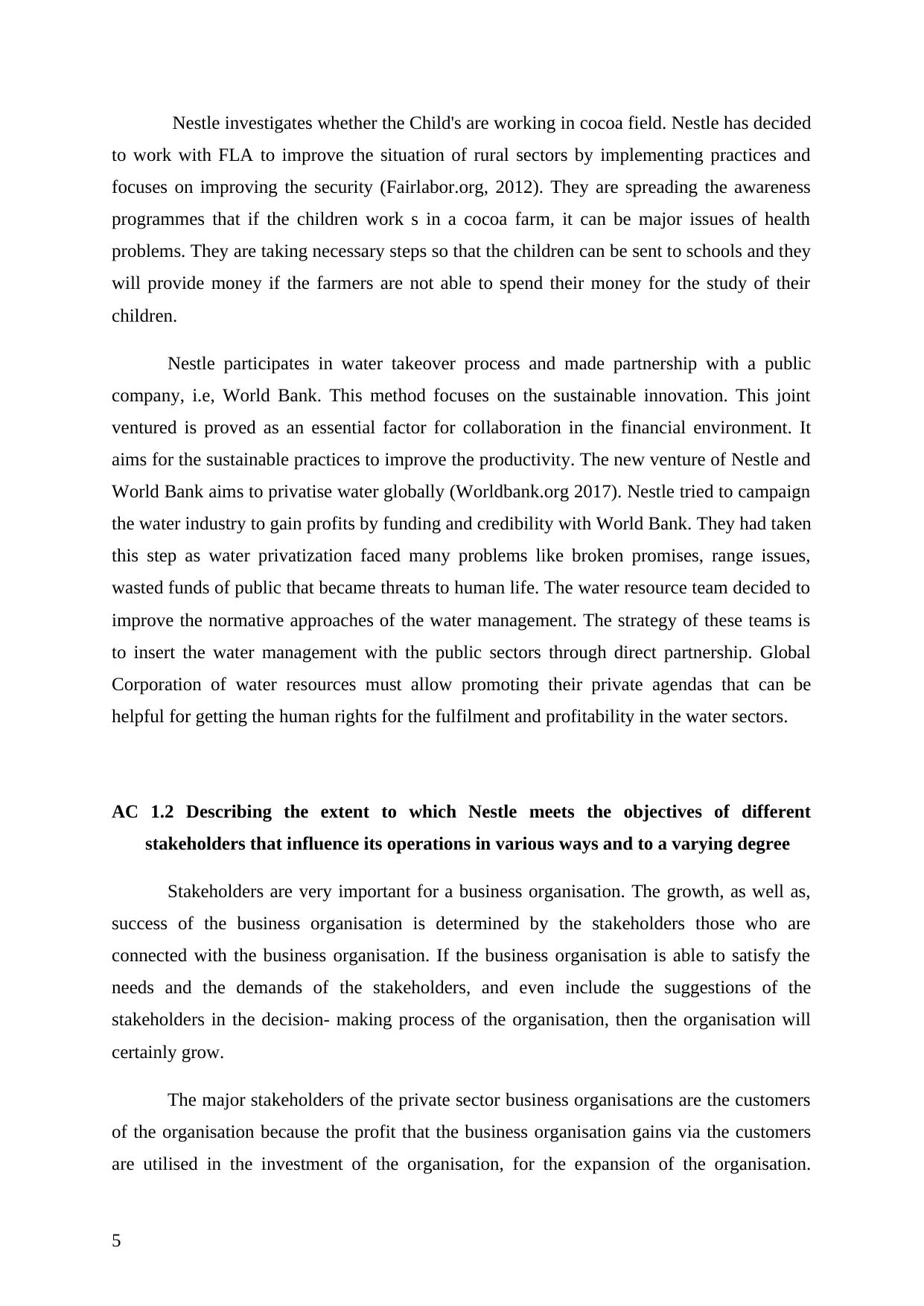
Nestle investigates whether the Child's are working in cocoa field. Nestle has decided
to work with FLA to improve the situation of rural sectors by implementing practices and
focuses on improving the security (Fairlabor.org, 2012). They are spreading the awareness
programmes that if the children work s in a cocoa farm, it can be major issues of health
problems. They are taking necessary steps so that the children can be sent to schools and they
will provide money if the farmers are not able to spend their money for the study of their
children.
Nestle participates in water takeover process and made partnership with a public
company, i.e, World Bank. This method focuses on the sustainable innovation. This joint
ventured is proved as an essential factor for collaboration in the financial environment. It
aims for the sustainable practices to improve the productivity. The new venture of Nestle and
World Bank aims to privatise water globally (Worldbank.org 2017). Nestle tried to campaign
the water industry to gain profits by funding and credibility with World Bank. They had taken
this step as water privatization faced many problems like broken promises, range issues,
wasted funds of public that became threats to human life. The water resource team decided to
improve the normative approaches of the water management. The strategy of these teams is
to insert the water management with the public sectors through direct partnership. Global
Corporation of water resources must allow promoting their private agendas that can be
helpful for getting the human rights for the fulfilment and profitability in the water sectors.
AC 1.2 Describing the extent to which Nestle meets the objectives of different
stakeholders that influence its operations in various ways and to a varying degree
Stakeholders are very important for a business organisation. The growth, as well as,
success of the business organisation is determined by the stakeholders those who are
connected with the business organisation. If the business organisation is able to satisfy the
needs and the demands of the stakeholders, and even include the suggestions of the
stakeholders in the decision- making process of the organisation, then the organisation will
certainly grow.
The major stakeholders of the private sector business organisations are the customers
of the organisation because the profit that the business organisation gains via the customers
are utilised in the investment of the organisation, for the expansion of the organisation.
5
to work with FLA to improve the situation of rural sectors by implementing practices and
focuses on improving the security (Fairlabor.org, 2012). They are spreading the awareness
programmes that if the children work s in a cocoa farm, it can be major issues of health
problems. They are taking necessary steps so that the children can be sent to schools and they
will provide money if the farmers are not able to spend their money for the study of their
children.
Nestle participates in water takeover process and made partnership with a public
company, i.e, World Bank. This method focuses on the sustainable innovation. This joint
ventured is proved as an essential factor for collaboration in the financial environment. It
aims for the sustainable practices to improve the productivity. The new venture of Nestle and
World Bank aims to privatise water globally (Worldbank.org 2017). Nestle tried to campaign
the water industry to gain profits by funding and credibility with World Bank. They had taken
this step as water privatization faced many problems like broken promises, range issues,
wasted funds of public that became threats to human life. The water resource team decided to
improve the normative approaches of the water management. The strategy of these teams is
to insert the water management with the public sectors through direct partnership. Global
Corporation of water resources must allow promoting their private agendas that can be
helpful for getting the human rights for the fulfilment and profitability in the water sectors.
AC 1.2 Describing the extent to which Nestle meets the objectives of different
stakeholders that influence its operations in various ways and to a varying degree
Stakeholders are very important for a business organisation. The growth, as well as,
success of the business organisation is determined by the stakeholders those who are
connected with the business organisation. If the business organisation is able to satisfy the
needs and the demands of the stakeholders, and even include the suggestions of the
stakeholders in the decision- making process of the organisation, then the organisation will
certainly grow.
The major stakeholders of the private sector business organisations are the customers
of the organisation because the profit that the business organisation gains via the customers
are utilised in the investment of the organisation, for the expansion of the organisation.
5
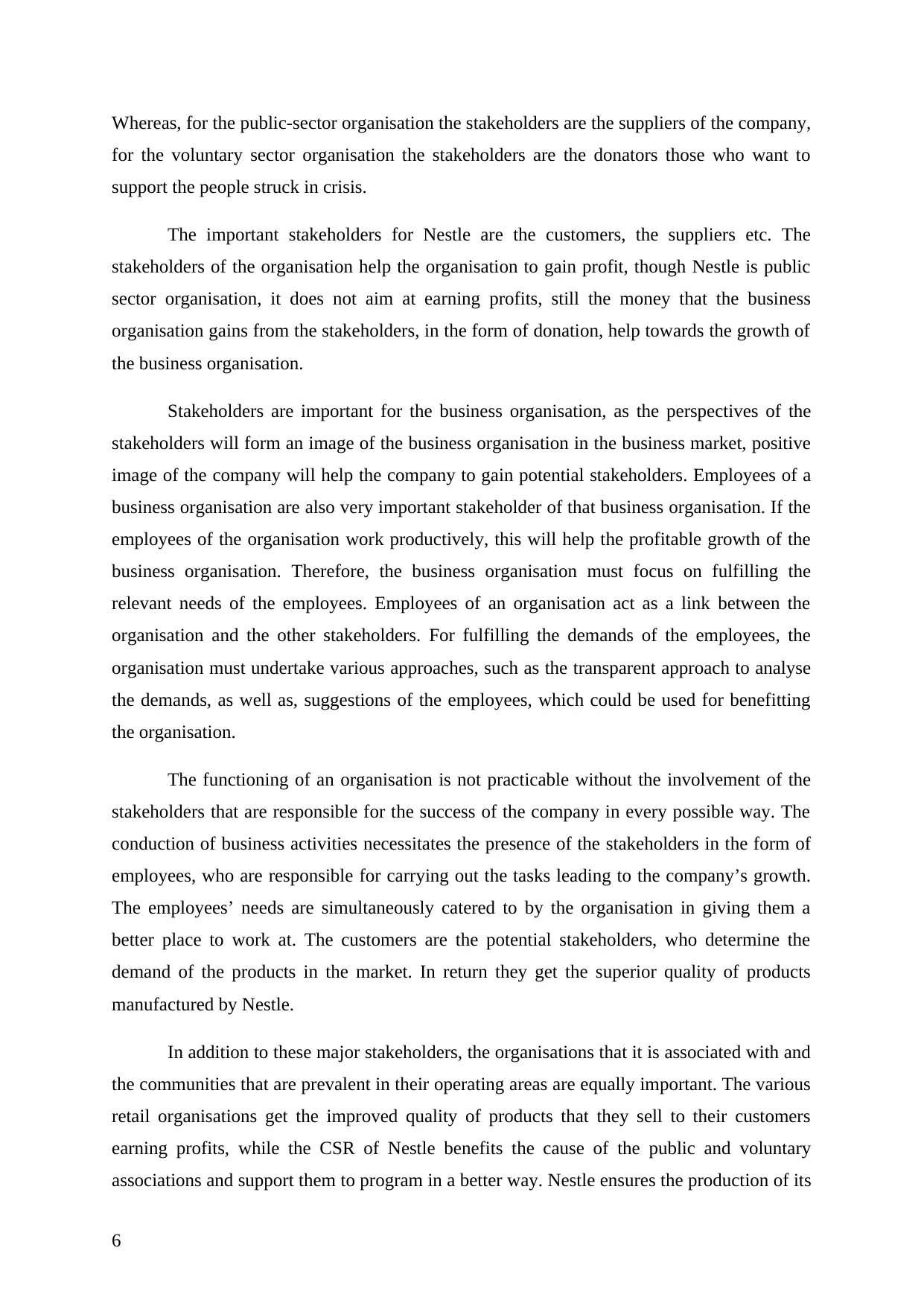
Whereas, for the public-sector organisation the stakeholders are the suppliers of the company,
for the voluntary sector organisation the stakeholders are the donators those who want to
support the people struck in crisis.
The important stakeholders for Nestle are the customers, the suppliers etc. The
stakeholders of the organisation help the organisation to gain profit, though Nestle is public
sector organisation, it does not aim at earning profits, still the money that the business
organisation gains from the stakeholders, in the form of donation, help towards the growth of
the business organisation.
Stakeholders are important for the business organisation, as the perspectives of the
stakeholders will form an image of the business organisation in the business market, positive
image of the company will help the company to gain potential stakeholders. Employees of a
business organisation are also very important stakeholder of that business organisation. If the
employees of the organisation work productively, this will help the profitable growth of the
business organisation. Therefore, the business organisation must focus on fulfilling the
relevant needs of the employees. Employees of an organisation act as a link between the
organisation and the other stakeholders. For fulfilling the demands of the employees, the
organisation must undertake various approaches, such as the transparent approach to analyse
the demands, as well as, suggestions of the employees, which could be used for benefitting
the organisation.
The functioning of an organisation is not practicable without the involvement of the
stakeholders that are responsible for the success of the company in every possible way. The
conduction of business activities necessitates the presence of the stakeholders in the form of
employees, who are responsible for carrying out the tasks leading to the company’s growth.
The employees’ needs are simultaneously catered to by the organisation in giving them a
better place to work at. The customers are the potential stakeholders, who determine the
demand of the products in the market. In return they get the superior quality of products
manufactured by Nestle.
In addition to these major stakeholders, the organisations that it is associated with and
the communities that are prevalent in their operating areas are equally important. The various
retail organisations get the improved quality of products that they sell to their customers
earning profits, while the CSR of Nestle benefits the cause of the public and voluntary
associations and support them to program in a better way. Nestle ensures the production of its
6
for the voluntary sector organisation the stakeholders are the donators those who want to
support the people struck in crisis.
The important stakeholders for Nestle are the customers, the suppliers etc. The
stakeholders of the organisation help the organisation to gain profit, though Nestle is public
sector organisation, it does not aim at earning profits, still the money that the business
organisation gains from the stakeholders, in the form of donation, help towards the growth of
the business organisation.
Stakeholders are important for the business organisation, as the perspectives of the
stakeholders will form an image of the business organisation in the business market, positive
image of the company will help the company to gain potential stakeholders. Employees of a
business organisation are also very important stakeholder of that business organisation. If the
employees of the organisation work productively, this will help the profitable growth of the
business organisation. Therefore, the business organisation must focus on fulfilling the
relevant needs of the employees. Employees of an organisation act as a link between the
organisation and the other stakeholders. For fulfilling the demands of the employees, the
organisation must undertake various approaches, such as the transparent approach to analyse
the demands, as well as, suggestions of the employees, which could be used for benefitting
the organisation.
The functioning of an organisation is not practicable without the involvement of the
stakeholders that are responsible for the success of the company in every possible way. The
conduction of business activities necessitates the presence of the stakeholders in the form of
employees, who are responsible for carrying out the tasks leading to the company’s growth.
The employees’ needs are simultaneously catered to by the organisation in giving them a
better place to work at. The customers are the potential stakeholders, who determine the
demand of the products in the market. In return they get the superior quality of products
manufactured by Nestle.
In addition to these major stakeholders, the organisations that it is associated with and
the communities that are prevalent in their operating areas are equally important. The various
retail organisations get the improved quality of products that they sell to their customers
earning profits, while the CSR of Nestle benefits the cause of the public and voluntary
associations and support them to program in a better way. Nestle ensures the production of its
6
⊘ This is a preview!⊘
Do you want full access?
Subscribe today to unlock all pages.

Trusted by 1+ million students worldwide
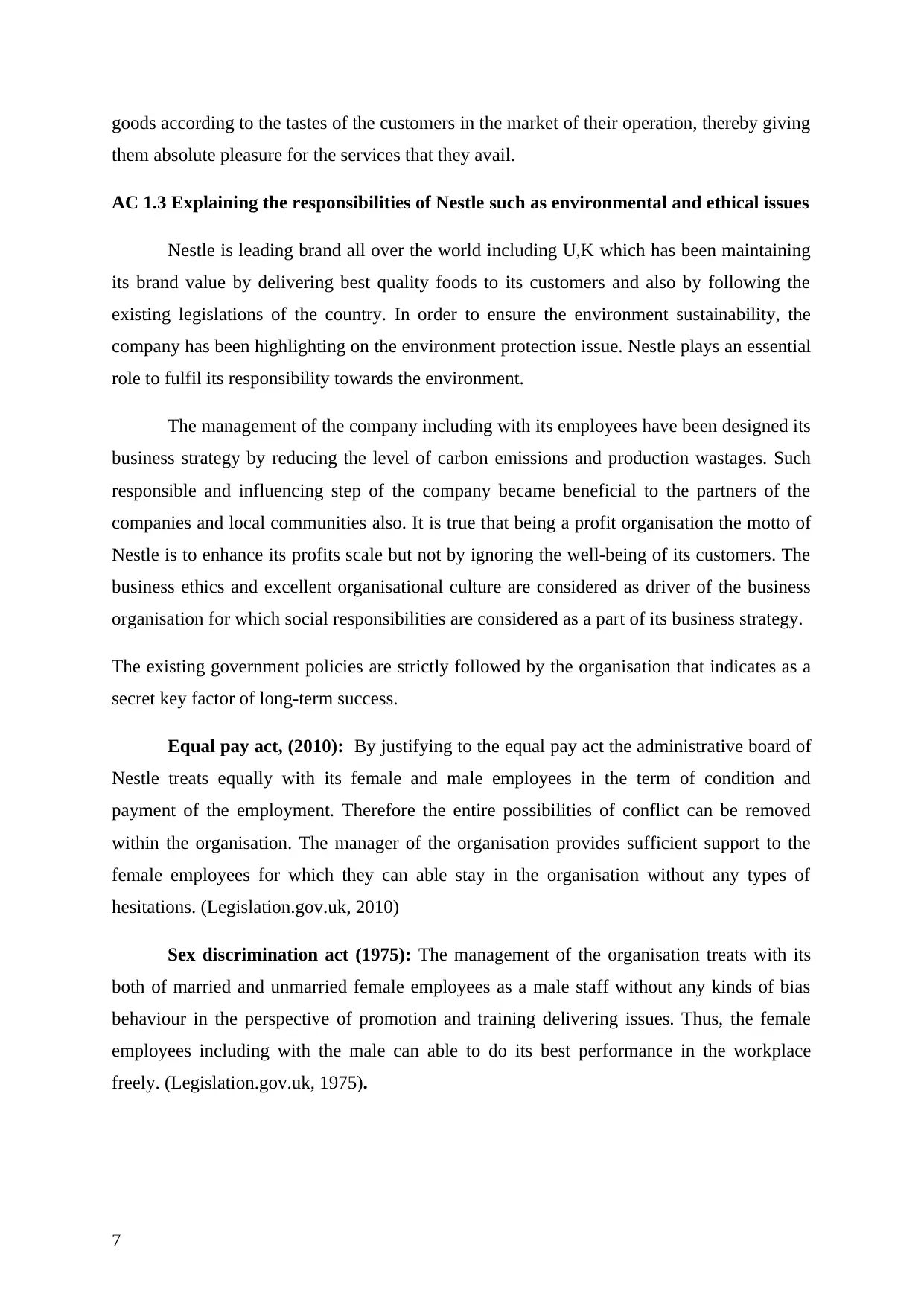
goods according to the tastes of the customers in the market of their operation, thereby giving
them absolute pleasure for the services that they avail.
AC 1.3 Explaining the responsibilities of Nestle such as environmental and ethical issues
Nestle is leading brand all over the world including U,K which has been maintaining
its brand value by delivering best quality foods to its customers and also by following the
existing legislations of the country. In order to ensure the environment sustainability, the
company has been highlighting on the environment protection issue. Nestle plays an essential
role to fulfil its responsibility towards the environment.
The management of the company including with its employees have been designed its
business strategy by reducing the level of carbon emissions and production wastages. Such
responsible and influencing step of the company became beneficial to the partners of the
companies and local communities also. It is true that being a profit organisation the motto of
Nestle is to enhance its profits scale but not by ignoring the well-being of its customers. The
business ethics and excellent organisational culture are considered as driver of the business
organisation for which social responsibilities are considered as a part of its business strategy.
The existing government policies are strictly followed by the organisation that indicates as a
secret key factor of long-term success.
Equal pay act, (2010): By justifying to the equal pay act the administrative board of
Nestle treats equally with its female and male employees in the term of condition and
payment of the employment. Therefore the entire possibilities of conflict can be removed
within the organisation. The manager of the organisation provides sufficient support to the
female employees for which they can able stay in the organisation without any types of
hesitations. (Legislation.gov.uk, 2010)
Sex discrimination act (1975): The management of the organisation treats with its
both of married and unmarried female employees as a male staff without any kinds of bias
behaviour in the perspective of promotion and training delivering issues. Thus, the female
employees including with the male can able to do its best performance in the workplace
freely. (Legislation.gov.uk, 1975).
7
them absolute pleasure for the services that they avail.
AC 1.3 Explaining the responsibilities of Nestle such as environmental and ethical issues
Nestle is leading brand all over the world including U,K which has been maintaining
its brand value by delivering best quality foods to its customers and also by following the
existing legislations of the country. In order to ensure the environment sustainability, the
company has been highlighting on the environment protection issue. Nestle plays an essential
role to fulfil its responsibility towards the environment.
The management of the company including with its employees have been designed its
business strategy by reducing the level of carbon emissions and production wastages. Such
responsible and influencing step of the company became beneficial to the partners of the
companies and local communities also. It is true that being a profit organisation the motto of
Nestle is to enhance its profits scale but not by ignoring the well-being of its customers. The
business ethics and excellent organisational culture are considered as driver of the business
organisation for which social responsibilities are considered as a part of its business strategy.
The existing government policies are strictly followed by the organisation that indicates as a
secret key factor of long-term success.
Equal pay act, (2010): By justifying to the equal pay act the administrative board of
Nestle treats equally with its female and male employees in the term of condition and
payment of the employment. Therefore the entire possibilities of conflict can be removed
within the organisation. The manager of the organisation provides sufficient support to the
female employees for which they can able stay in the organisation without any types of
hesitations. (Legislation.gov.uk, 2010)
Sex discrimination act (1975): The management of the organisation treats with its
both of married and unmarried female employees as a male staff without any kinds of bias
behaviour in the perspective of promotion and training delivering issues. Thus, the female
employees including with the male can able to do its best performance in the workplace
freely. (Legislation.gov.uk, 1975).
7
Paraphrase This Document
Need a fresh take? Get an instant paraphrase of this document with our AI Paraphraser
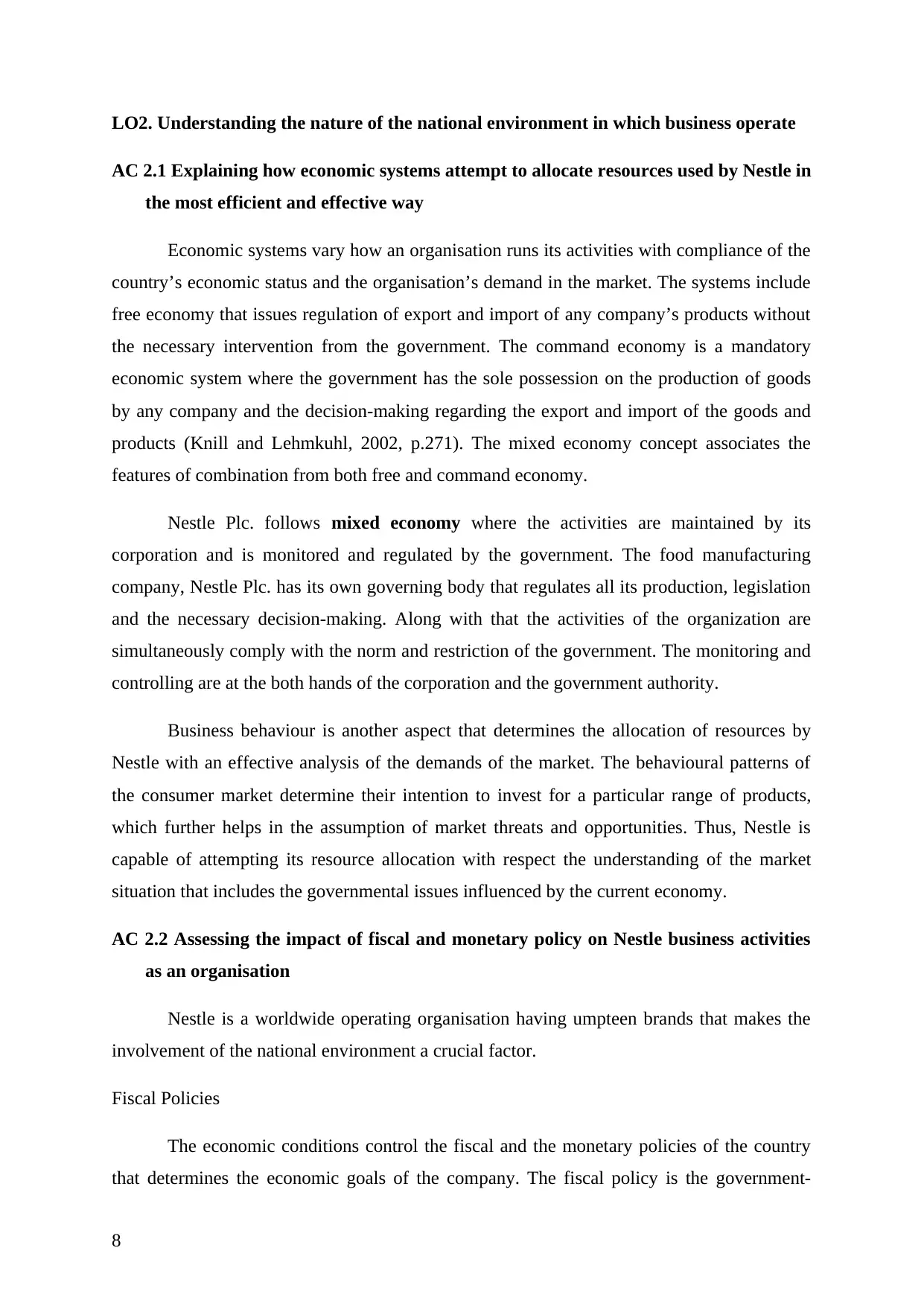
LO2. Understanding the nature of the national environment in which business operate
AC 2.1 Explaining how economic systems attempt to allocate resources used by Nestle in
the most efficient and effective way
Economic systems vary how an organisation runs its activities with compliance of the
country’s economic status and the organisation’s demand in the market. The systems include
free economy that issues regulation of export and import of any company’s products without
the necessary intervention from the government. The command economy is a mandatory
economic system where the government has the sole possession on the production of goods
by any company and the decision-making regarding the export and import of the goods and
products (Knill and Lehmkuhl, 2002, p.271). The mixed economy concept associates the
features of combination from both free and command economy.
Nestle Plc. follows mixed economy where the activities are maintained by its
corporation and is monitored and regulated by the government. The food manufacturing
company, Nestle Plc. has its own governing body that regulates all its production, legislation
and the necessary decision-making. Along with that the activities of the organization are
simultaneously comply with the norm and restriction of the government. The monitoring and
controlling are at the both hands of the corporation and the government authority.
Business behaviour is another aspect that determines the allocation of resources by
Nestle with an effective analysis of the demands of the market. The behavioural patterns of
the consumer market determine their intention to invest for a particular range of products,
which further helps in the assumption of market threats and opportunities. Thus, Nestle is
capable of attempting its resource allocation with respect the understanding of the market
situation that includes the governmental issues influenced by the current economy.
AC 2.2 Assessing the impact of fiscal and monetary policy on Nestle business activities
as an organisation
Nestle is a worldwide operating organisation having umpteen brands that makes the
involvement of the national environment a crucial factor.
Fiscal Policies
The economic conditions control the fiscal and the monetary policies of the country
that determines the economic goals of the company. The fiscal policy is the government-
8
AC 2.1 Explaining how economic systems attempt to allocate resources used by Nestle in
the most efficient and effective way
Economic systems vary how an organisation runs its activities with compliance of the
country’s economic status and the organisation’s demand in the market. The systems include
free economy that issues regulation of export and import of any company’s products without
the necessary intervention from the government. The command economy is a mandatory
economic system where the government has the sole possession on the production of goods
by any company and the decision-making regarding the export and import of the goods and
products (Knill and Lehmkuhl, 2002, p.271). The mixed economy concept associates the
features of combination from both free and command economy.
Nestle Plc. follows mixed economy where the activities are maintained by its
corporation and is monitored and regulated by the government. The food manufacturing
company, Nestle Plc. has its own governing body that regulates all its production, legislation
and the necessary decision-making. Along with that the activities of the organization are
simultaneously comply with the norm and restriction of the government. The monitoring and
controlling are at the both hands of the corporation and the government authority.
Business behaviour is another aspect that determines the allocation of resources by
Nestle with an effective analysis of the demands of the market. The behavioural patterns of
the consumer market determine their intention to invest for a particular range of products,
which further helps in the assumption of market threats and opportunities. Thus, Nestle is
capable of attempting its resource allocation with respect the understanding of the market
situation that includes the governmental issues influenced by the current economy.
AC 2.2 Assessing the impact of fiscal and monetary policy on Nestle business activities
as an organisation
Nestle is a worldwide operating organisation having umpteen brands that makes the
involvement of the national environment a crucial factor.
Fiscal Policies
The economic conditions control the fiscal and the monetary policies of the country
that determines the economic goals of the company. The fiscal policy is the government-
8
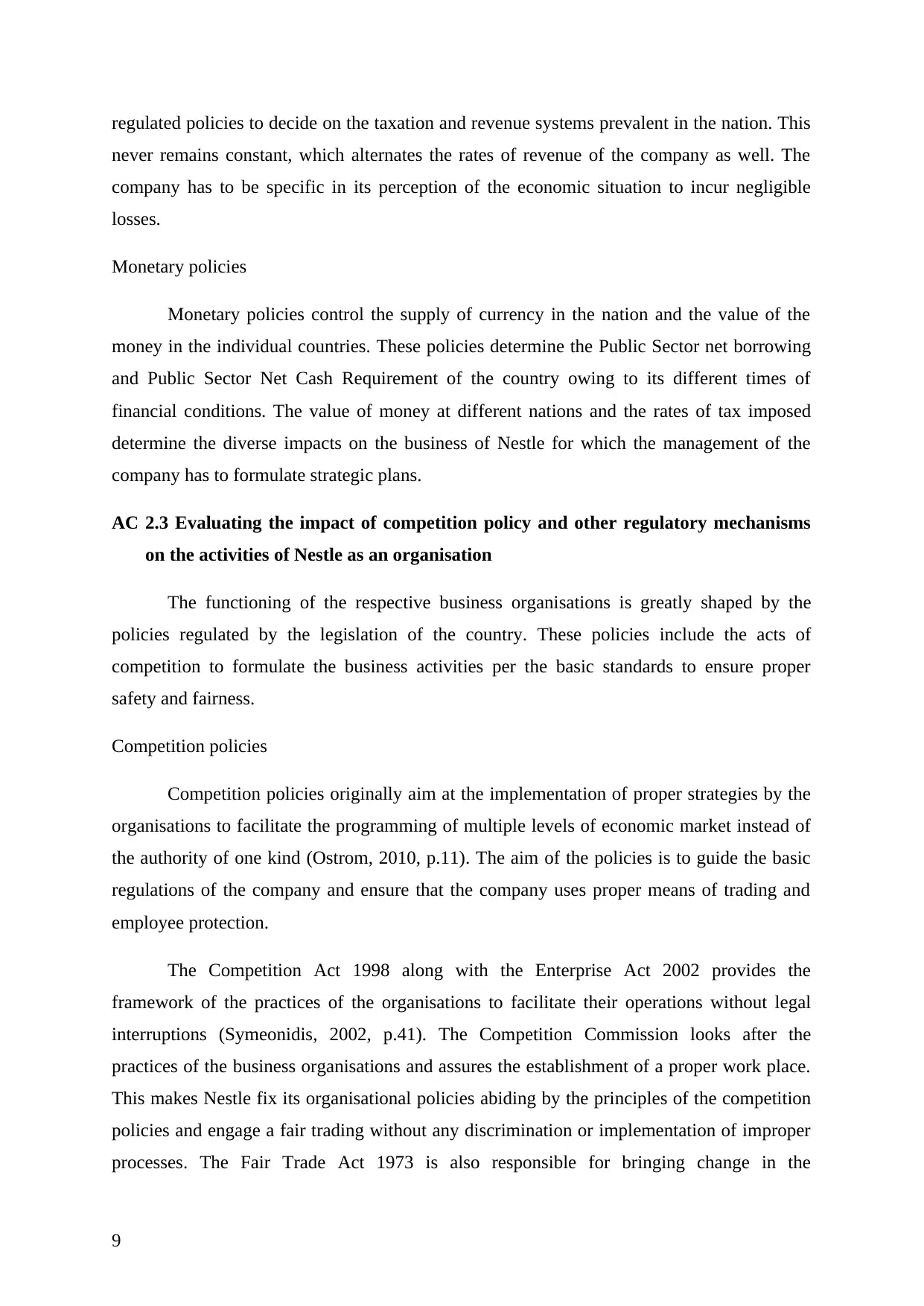
regulated policies to decide on the taxation and revenue systems prevalent in the nation. This
never remains constant, which alternates the rates of revenue of the company as well. The
company has to be specific in its perception of the economic situation to incur negligible
losses.
Monetary policies
Monetary policies control the supply of currency in the nation and the value of the
money in the individual countries. These policies determine the Public Sector net borrowing
and Public Sector Net Cash Requirement of the country owing to its different times of
financial conditions. The value of money at different nations and the rates of tax imposed
determine the diverse impacts on the business of Nestle for which the management of the
company has to formulate strategic plans.
AC 2.3 Evaluating the impact of competition policy and other regulatory mechanisms
on the activities of Nestle as an organisation
The functioning of the respective business organisations is greatly shaped by the
policies regulated by the legislation of the country. These policies include the acts of
competition to formulate the business activities per the basic standards to ensure proper
safety and fairness.
Competition policies
Competition policies originally aim at the implementation of proper strategies by the
organisations to facilitate the programming of multiple levels of economic market instead of
the authority of one kind (Ostrom, 2010, p.11). The aim of the policies is to guide the basic
regulations of the company and ensure that the company uses proper means of trading and
employee protection.
The Competition Act 1998 along with the Enterprise Act 2002 provides the
framework of the practices of the organisations to facilitate their operations without legal
interruptions (Symeonidis, 2002, p.41). The Competition Commission looks after the
practices of the business organisations and assures the establishment of a proper work place.
This makes Nestle fix its organisational policies abiding by the principles of the competition
policies and engage a fair trading without any discrimination or implementation of improper
processes. The Fair Trade Act 1973 is also responsible for bringing change in the
9
never remains constant, which alternates the rates of revenue of the company as well. The
company has to be specific in its perception of the economic situation to incur negligible
losses.
Monetary policies
Monetary policies control the supply of currency in the nation and the value of the
money in the individual countries. These policies determine the Public Sector net borrowing
and Public Sector Net Cash Requirement of the country owing to its different times of
financial conditions. The value of money at different nations and the rates of tax imposed
determine the diverse impacts on the business of Nestle for which the management of the
company has to formulate strategic plans.
AC 2.3 Evaluating the impact of competition policy and other regulatory mechanisms
on the activities of Nestle as an organisation
The functioning of the respective business organisations is greatly shaped by the
policies regulated by the legislation of the country. These policies include the acts of
competition to formulate the business activities per the basic standards to ensure proper
safety and fairness.
Competition policies
Competition policies originally aim at the implementation of proper strategies by the
organisations to facilitate the programming of multiple levels of economic market instead of
the authority of one kind (Ostrom, 2010, p.11). The aim of the policies is to guide the basic
regulations of the company and ensure that the company uses proper means of trading and
employee protection.
The Competition Act 1998 along with the Enterprise Act 2002 provides the
framework of the practices of the organisations to facilitate their operations without legal
interruptions (Symeonidis, 2002, p.41). The Competition Commission looks after the
practices of the business organisations and assures the establishment of a proper work place.
This makes Nestle fix its organisational policies abiding by the principles of the competition
policies and engage a fair trading without any discrimination or implementation of improper
processes. The Fair Trade Act 1973 is also responsible for bringing change in the
9
⊘ This is a preview!⊘
Do you want full access?
Subscribe today to unlock all pages.

Trusted by 1+ million students worldwide
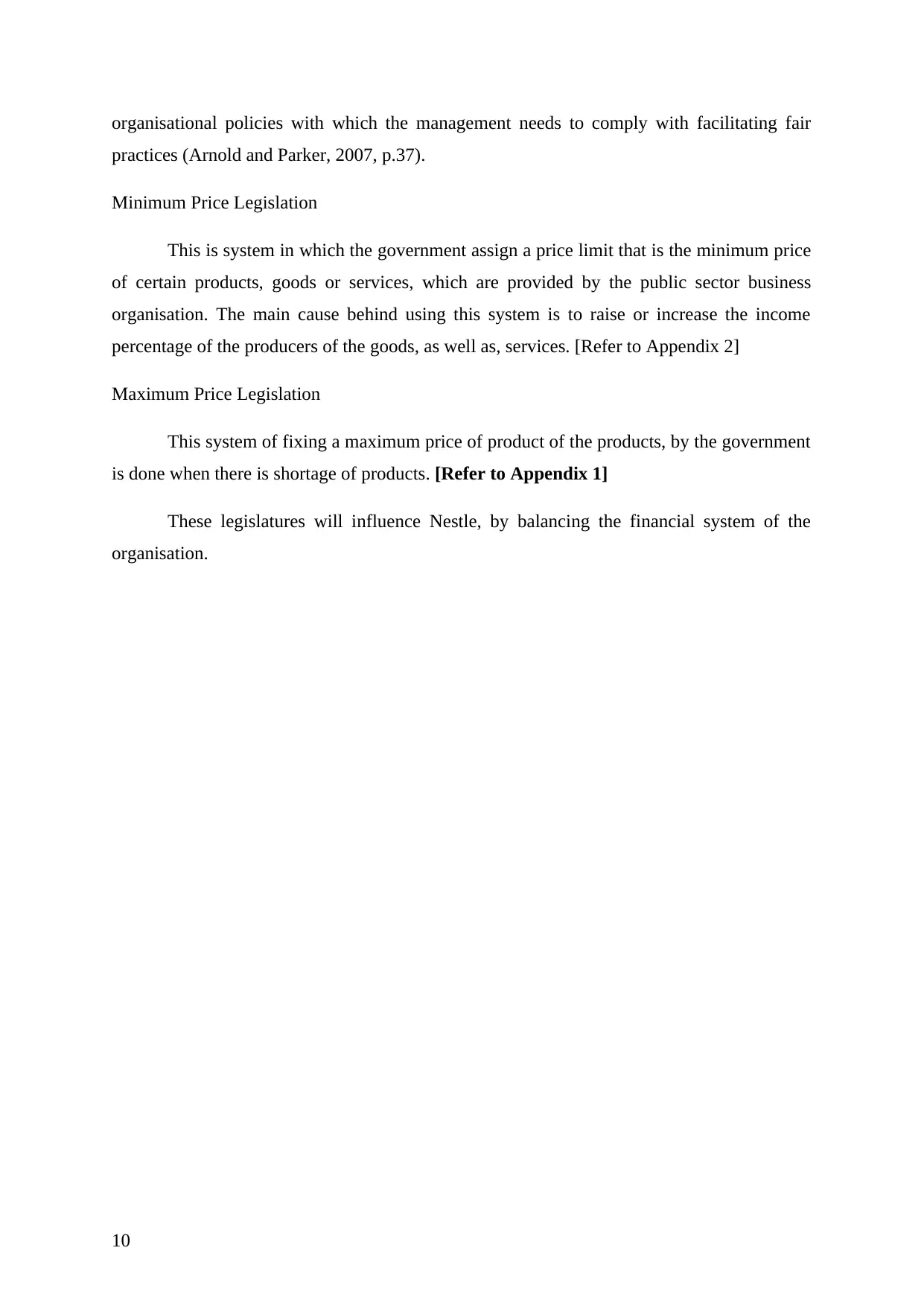
organisational policies with which the management needs to comply with facilitating fair
practices (Arnold and Parker, 2007, p.37).
Minimum Price Legislation
This is system in which the government assign a price limit that is the minimum price
of certain products, goods or services, which are provided by the public sector business
organisation. The main cause behind using this system is to raise or increase the income
percentage of the producers of the goods, as well as, services. [Refer to Appendix 2]
Maximum Price Legislation
This system of fixing a maximum price of product of the products, by the government
is done when there is shortage of products. [Refer to Appendix 1]
These legislatures will influence Nestle, by balancing the financial system of the
organisation.
10
practices (Arnold and Parker, 2007, p.37).
Minimum Price Legislation
This is system in which the government assign a price limit that is the minimum price
of certain products, goods or services, which are provided by the public sector business
organisation. The main cause behind using this system is to raise or increase the income
percentage of the producers of the goods, as well as, services. [Refer to Appendix 2]
Maximum Price Legislation
This system of fixing a maximum price of product of the products, by the government
is done when there is shortage of products. [Refer to Appendix 1]
These legislatures will influence Nestle, by balancing the financial system of the
organisation.
10
Paraphrase This Document
Need a fresh take? Get an instant paraphrase of this document with our AI Paraphraser
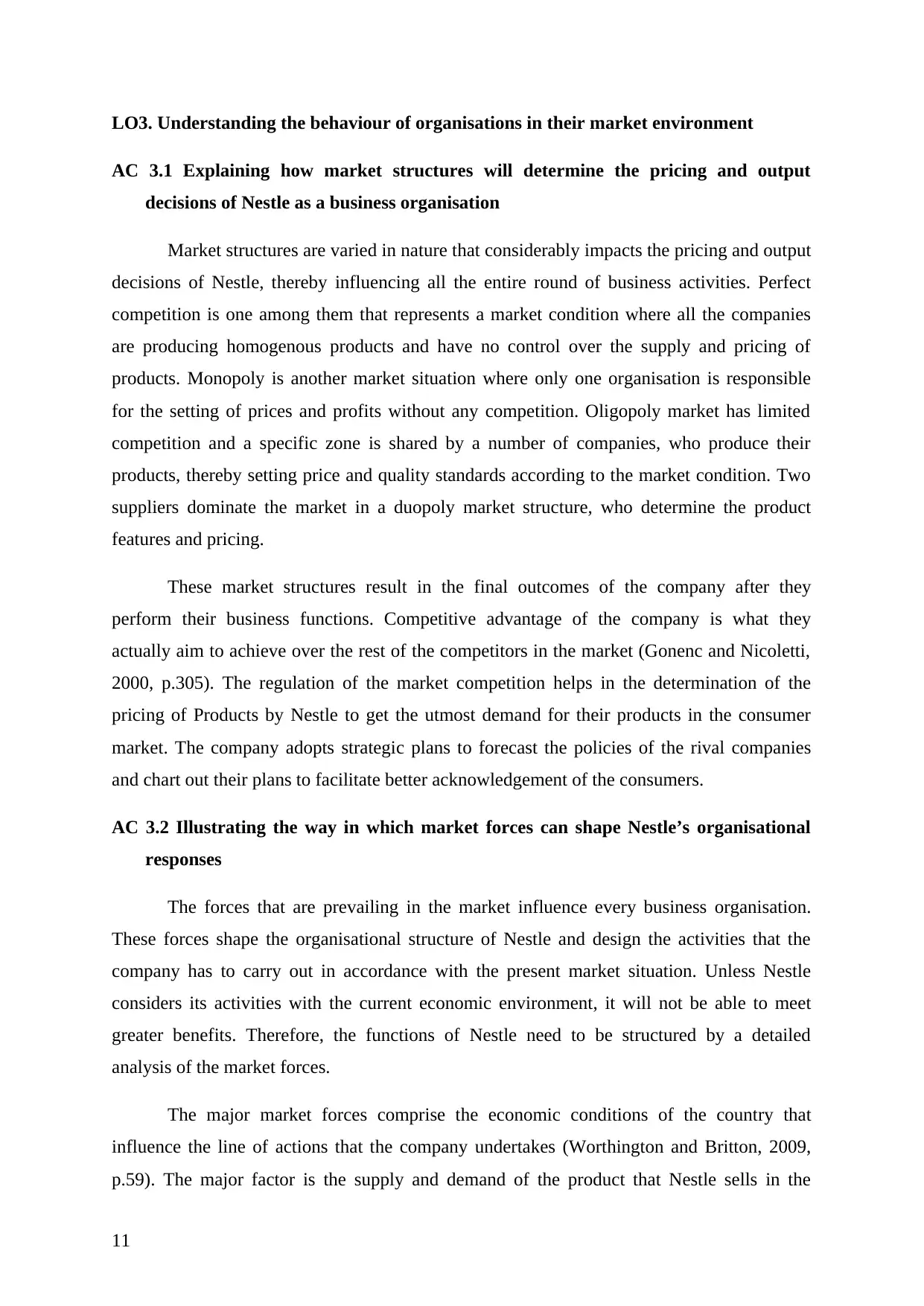
LO3. Understanding the behaviour of organisations in their market environment
AC 3.1 Explaining how market structures will determine the pricing and output
decisions of Nestle as a business organisation
Market structures are varied in nature that considerably impacts the pricing and output
decisions of Nestle, thereby influencing all the entire round of business activities. Perfect
competition is one among them that represents a market condition where all the companies
are producing homogenous products and have no control over the supply and pricing of
products. Monopoly is another market situation where only one organisation is responsible
for the setting of prices and profits without any competition. Oligopoly market has limited
competition and a specific zone is shared by a number of companies, who produce their
products, thereby setting price and quality standards according to the market condition. Two
suppliers dominate the market in a duopoly market structure, who determine the product
features and pricing.
These market structures result in the final outcomes of the company after they
perform their business functions. Competitive advantage of the company is what they
actually aim to achieve over the rest of the competitors in the market (Gonenc and Nicoletti,
2000, p.305). The regulation of the market competition helps in the determination of the
pricing of Products by Nestle to get the utmost demand for their products in the consumer
market. The company adopts strategic plans to forecast the policies of the rival companies
and chart out their plans to facilitate better acknowledgement of the consumers.
AC 3.2 Illustrating the way in which market forces can shape Nestle’s organisational
responses
The forces that are prevailing in the market influence every business organisation.
These forces shape the organisational structure of Nestle and design the activities that the
company has to carry out in accordance with the present market situation. Unless Nestle
considers its activities with the current economic environment, it will not be able to meet
greater benefits. Therefore, the functions of Nestle need to be structured by a detailed
analysis of the market forces.
The major market forces comprise the economic conditions of the country that
influence the line of actions that the company undertakes (Worthington and Britton, 2009,
p.59). The major factor is the supply and demand of the product that Nestle sells in the
11
AC 3.1 Explaining how market structures will determine the pricing and output
decisions of Nestle as a business organisation
Market structures are varied in nature that considerably impacts the pricing and output
decisions of Nestle, thereby influencing all the entire round of business activities. Perfect
competition is one among them that represents a market condition where all the companies
are producing homogenous products and have no control over the supply and pricing of
products. Monopoly is another market situation where only one organisation is responsible
for the setting of prices and profits without any competition. Oligopoly market has limited
competition and a specific zone is shared by a number of companies, who produce their
products, thereby setting price and quality standards according to the market condition. Two
suppliers dominate the market in a duopoly market structure, who determine the product
features and pricing.
These market structures result in the final outcomes of the company after they
perform their business functions. Competitive advantage of the company is what they
actually aim to achieve over the rest of the competitors in the market (Gonenc and Nicoletti,
2000, p.305). The regulation of the market competition helps in the determination of the
pricing of Products by Nestle to get the utmost demand for their products in the consumer
market. The company adopts strategic plans to forecast the policies of the rival companies
and chart out their plans to facilitate better acknowledgement of the consumers.
AC 3.2 Illustrating the way in which market forces can shape Nestle’s organisational
responses
The forces that are prevailing in the market influence every business organisation.
These forces shape the organisational structure of Nestle and design the activities that the
company has to carry out in accordance with the present market situation. Unless Nestle
considers its activities with the current economic environment, it will not be able to meet
greater benefits. Therefore, the functions of Nestle need to be structured by a detailed
analysis of the market forces.
The major market forces comprise the economic conditions of the country that
influence the line of actions that the company undertakes (Worthington and Britton, 2009,
p.59). The major factor is the supply and demand of the product that Nestle sells in the
11
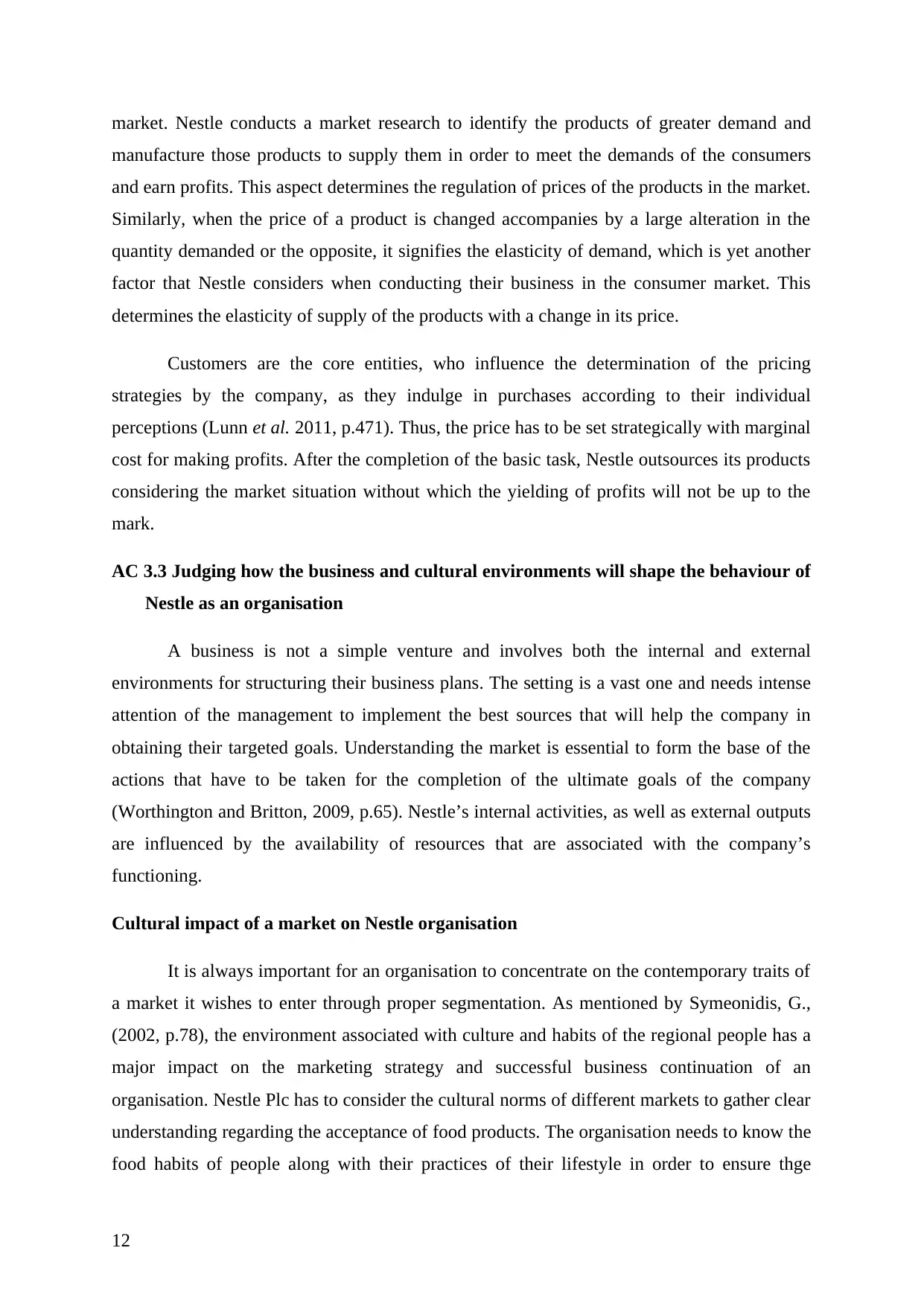
market. Nestle conducts a market research to identify the products of greater demand and
manufacture those products to supply them in order to meet the demands of the consumers
and earn profits. This aspect determines the regulation of prices of the products in the market.
Similarly, when the price of a product is changed accompanies by a large alteration in the
quantity demanded or the opposite, it signifies the elasticity of demand, which is yet another
factor that Nestle considers when conducting their business in the consumer market. This
determines the elasticity of supply of the products with a change in its price.
Customers are the core entities, who influence the determination of the pricing
strategies by the company, as they indulge in purchases according to their individual
perceptions (Lunn et al. 2011, p.471). Thus, the price has to be set strategically with marginal
cost for making profits. After the completion of the basic task, Nestle outsources its products
considering the market situation without which the yielding of profits will not be up to the
mark.
AC 3.3 Judging how the business and cultural environments will shape the behaviour of
Nestle as an organisation
A business is not a simple venture and involves both the internal and external
environments for structuring their business plans. The setting is a vast one and needs intense
attention of the management to implement the best sources that will help the company in
obtaining their targeted goals. Understanding the market is essential to form the base of the
actions that have to be taken for the completion of the ultimate goals of the company
(Worthington and Britton, 2009, p.65). Nestle’s internal activities, as well as external outputs
are influenced by the availability of resources that are associated with the company’s
functioning.
Cultural impact of a market on Nestle organisation
It is always important for an organisation to concentrate on the contemporary traits of
a market it wishes to enter through proper segmentation. As mentioned by Symeonidis, G.,
(2002, p.78), the environment associated with culture and habits of the regional people has a
major impact on the marketing strategy and successful business continuation of an
organisation. Nestle Plc has to consider the cultural norms of different markets to gather clear
understanding regarding the acceptance of food products. The organisation needs to know the
food habits of people along with their practices of their lifestyle in order to ensure thge
12
manufacture those products to supply them in order to meet the demands of the consumers
and earn profits. This aspect determines the regulation of prices of the products in the market.
Similarly, when the price of a product is changed accompanies by a large alteration in the
quantity demanded or the opposite, it signifies the elasticity of demand, which is yet another
factor that Nestle considers when conducting their business in the consumer market. This
determines the elasticity of supply of the products with a change in its price.
Customers are the core entities, who influence the determination of the pricing
strategies by the company, as they indulge in purchases according to their individual
perceptions (Lunn et al. 2011, p.471). Thus, the price has to be set strategically with marginal
cost for making profits. After the completion of the basic task, Nestle outsources its products
considering the market situation without which the yielding of profits will not be up to the
mark.
AC 3.3 Judging how the business and cultural environments will shape the behaviour of
Nestle as an organisation
A business is not a simple venture and involves both the internal and external
environments for structuring their business plans. The setting is a vast one and needs intense
attention of the management to implement the best sources that will help the company in
obtaining their targeted goals. Understanding the market is essential to form the base of the
actions that have to be taken for the completion of the ultimate goals of the company
(Worthington and Britton, 2009, p.65). Nestle’s internal activities, as well as external outputs
are influenced by the availability of resources that are associated with the company’s
functioning.
Cultural impact of a market on Nestle organisation
It is always important for an organisation to concentrate on the contemporary traits of
a market it wishes to enter through proper segmentation. As mentioned by Symeonidis, G.,
(2002, p.78), the environment associated with culture and habits of the regional people has a
major impact on the marketing strategy and successful business continuation of an
organisation. Nestle Plc has to consider the cultural norms of different markets to gather clear
understanding regarding the acceptance of food products. The organisation needs to know the
food habits of people along with their practices of their lifestyle in order to ensure thge
12
⊘ This is a preview!⊘
Do you want full access?
Subscribe today to unlock all pages.

Trusted by 1+ million students worldwide
1 out of 21
Related Documents
Your All-in-One AI-Powered Toolkit for Academic Success.
+13062052269
info@desklib.com
Available 24*7 on WhatsApp / Email
![[object Object]](/_next/static/media/star-bottom.7253800d.svg)
Unlock your academic potential
Copyright © 2020–2026 A2Z Services. All Rights Reserved. Developed and managed by ZUCOL.





